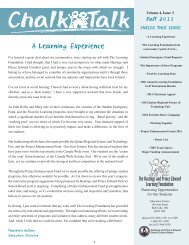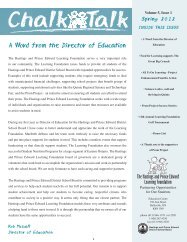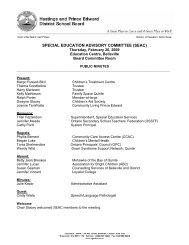Grade 11 Healthy Active Living Education Additional Supports ...
Grade 11 Healthy Active Living Education Additional Supports ...
Grade 11 Healthy Active Living Education Additional Supports ...
Create successful ePaper yourself
Turn your PDF publications into a flip-book with our unique Google optimized e-Paper software.
Positive Mental Health and Stress<br />
Public Profile<br />
Unit #3 Activity #3<br />
Teaching Learning Strategy #2 & #3<br />
Teacher Resource (Background Information)<br />
Catholic Profile<br />
Unit #5 Activity #4<br />
Teaching Learning Strategy #1<br />
Unit #5 Activity #5<br />
Teaching Learning Strategy #2<br />
Instructions:<br />
1. Have students generate a list of stressors and then categorize the stressors into one of<br />
the following categories, Physical, Social, Intellectual, Emotional, Spiritual, or<br />
Environmental.<br />
2. Distribute the Student Resource (Case Studies Worksheet). Ask students to<br />
categorize the case study examples into the appropriate stressor categories. Have<br />
them complete the Case Study Worksheet by filling in an appropriate strategy for<br />
each example.<br />
3. Have students read the statements on the Everyday Coping Student Resource<br />
(Worksheet). Students should identify the methods of copying for each situation.<br />
Stress and Stressors<br />
Stress: the effect of an event on your mind and body, these effects can be both helpful or<br />
harmful; the forms of stress can be either positive (e.g., something that one is looking<br />
forward to like a school dance or wedding) or negative (e.g., break-ups and death of a<br />
loved one)<br />
Stressors: situations and experiences that cause stress<br />
• Physical Stressors Ð (e.g., positive; strenuous activity), (e.g., negative; bacteria,<br />
smoke, lack of sleep, injury)<br />
• Social Stressors Ð (e.g., positive; receiving compliments, expectations of others),<br />
(e.g., negative; rejection, embarrassment, ridicule, arguments)<br />
• Intellectual Stressors Ð (e.g., positive; challenging problems), (e.g., negative; mental<br />
fatigue, inability to comprehend)<br />
• Emotional Stressors Ð (e.g., positive; falling in love), (e.g., negative; anger, lack of<br />
love, mistrust)<br />
• Spiritual Stressors - (e.g., positive; acting in accordance with your moral code), (e.g.,<br />
negative, guilt, moral conflicts, lack of meaning or purpose in life)<br />
• Environmental Stressors Ð (e.g., positive; possession of a lot of money), (e.g.,<br />
negative; lack of money, shelter, food)<br />
<strong>Grade</strong> <strong>11</strong> <strong>Healthy</strong> <strong>Active</strong> <strong>Living</strong> <strong>Education</strong> (PPL30), Module #2 Positive Mental Health and Stress<br />
Page 15
















